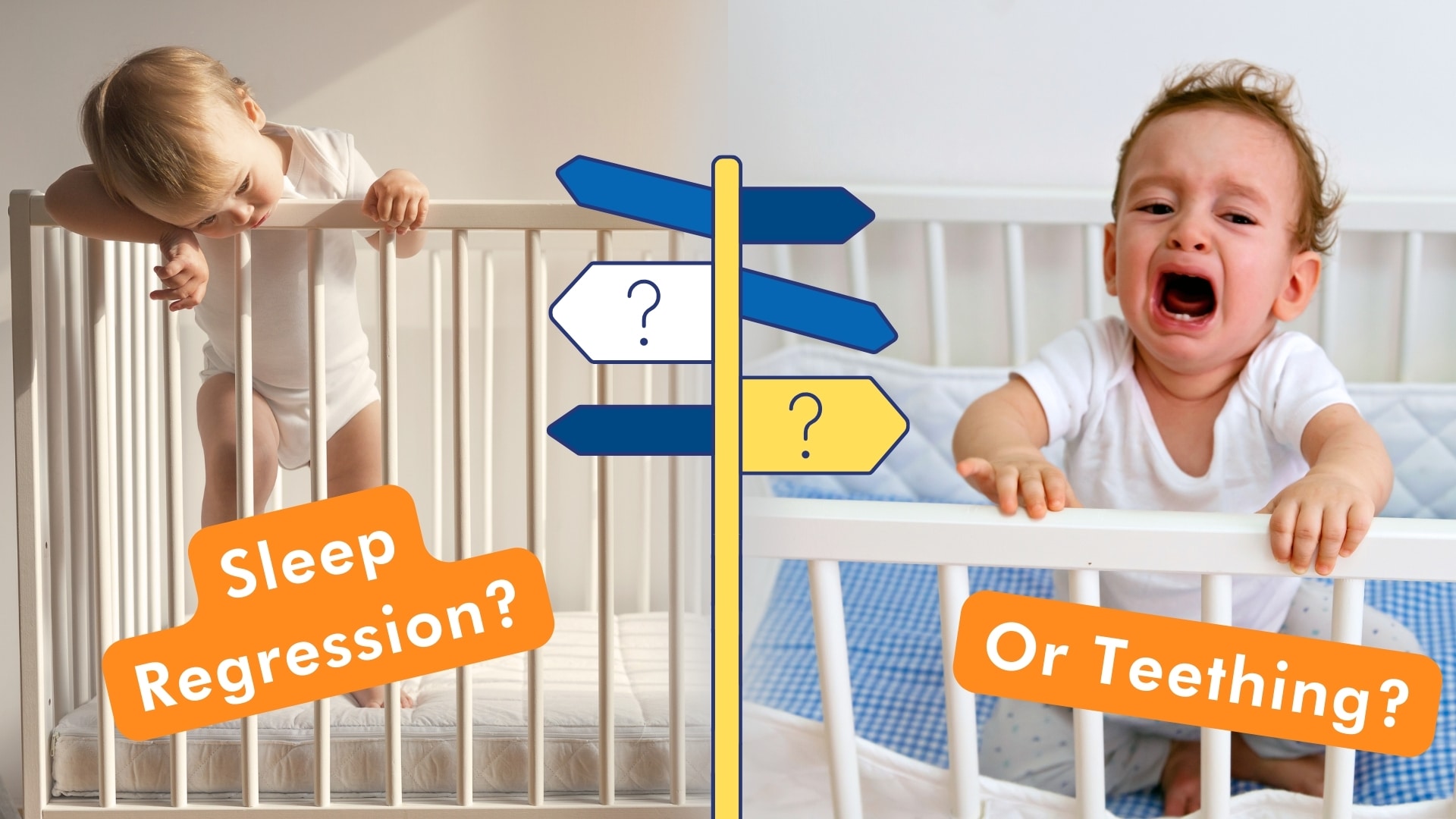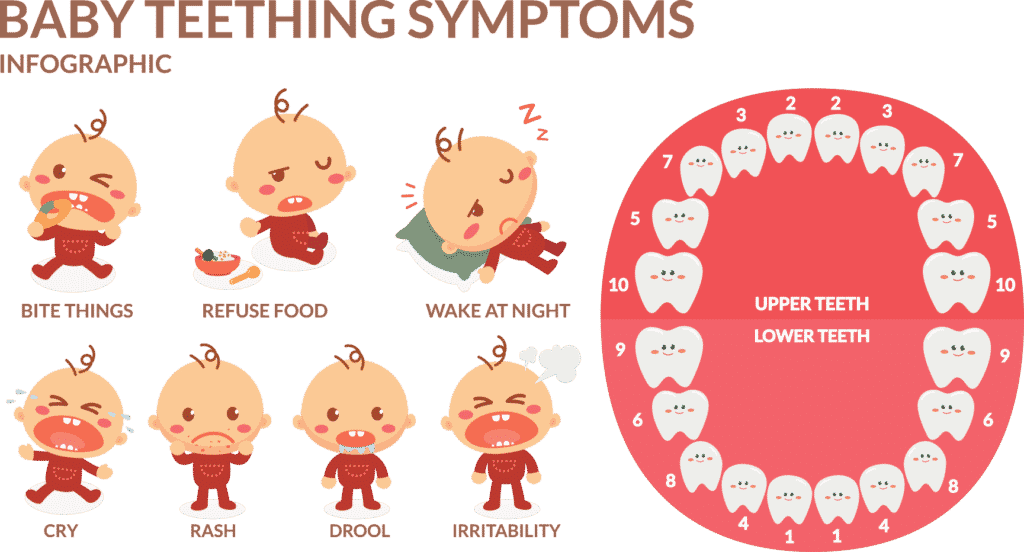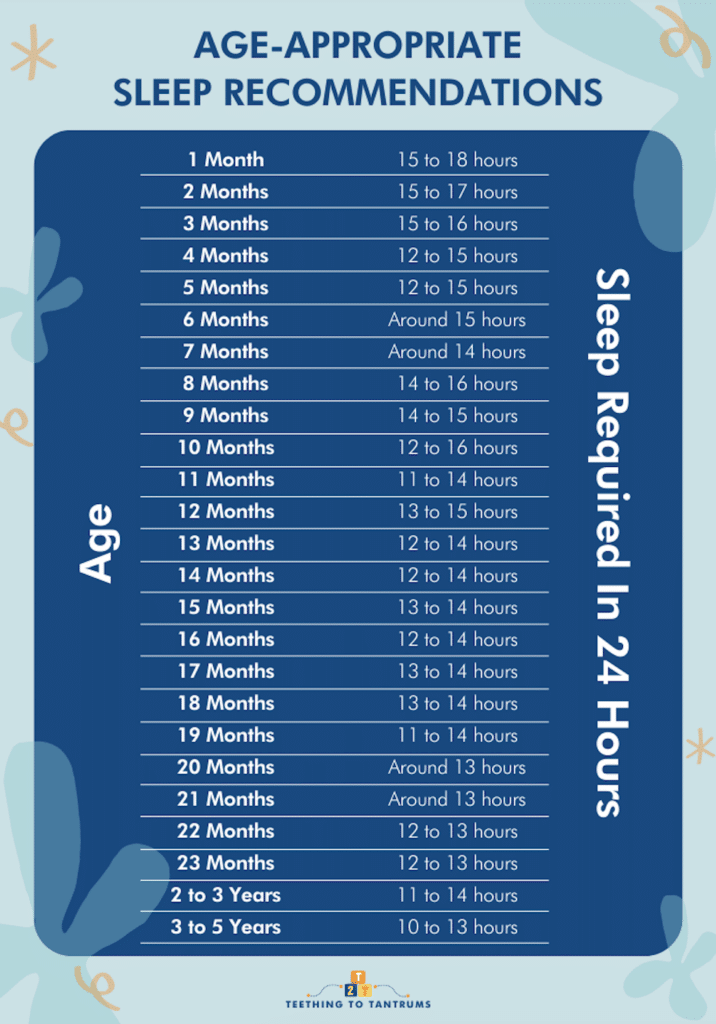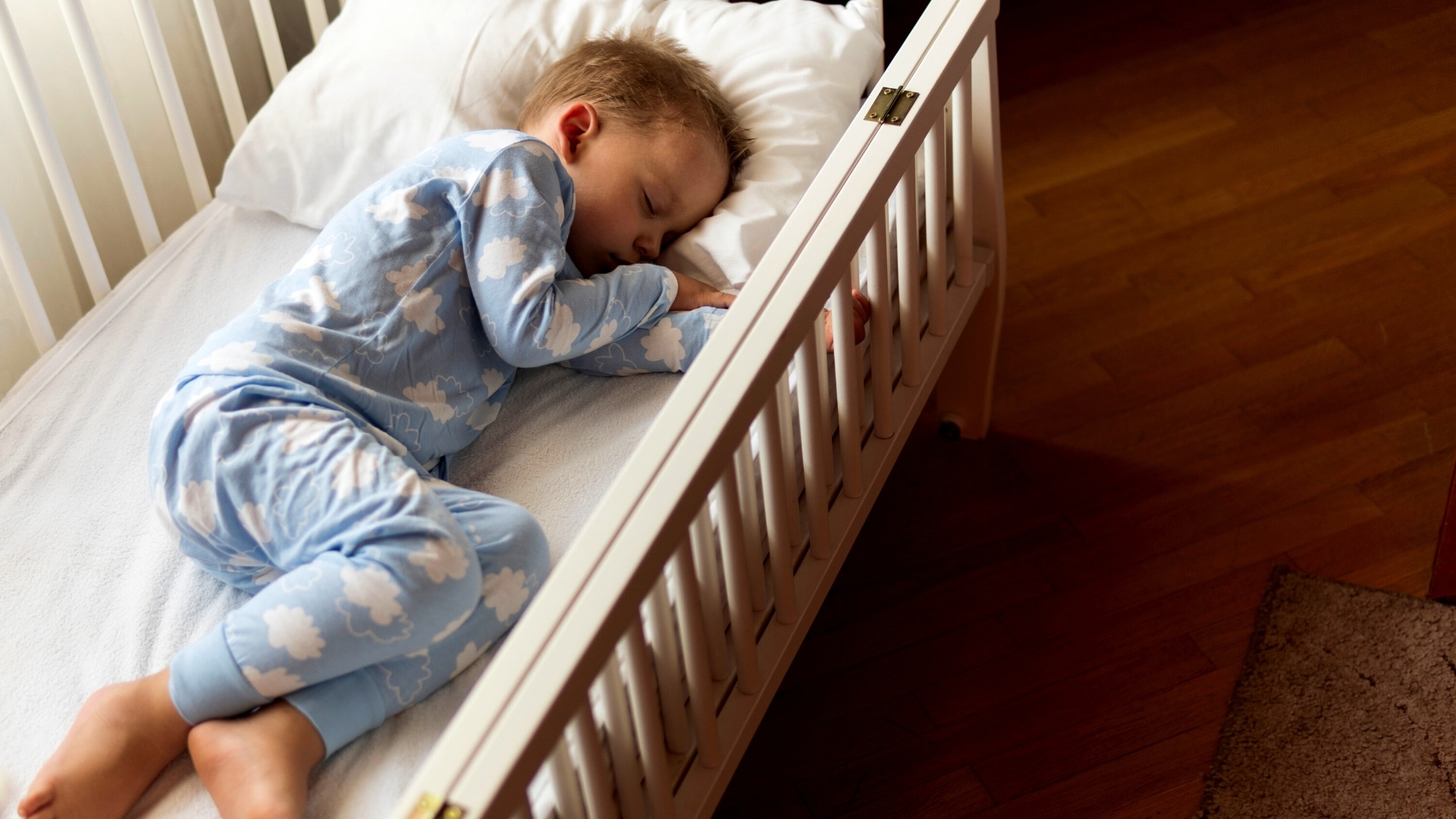Are you navigating the bleary-eyed journey of parenthood, finding yourself perplexed by your little one’s sudden nighttime awakenings?
Just when you thought you had a grasp on your baby’s sleep routine, the peaceful slumber has been replaced by restlessness and tears.
What’s to blame? A sleep regression or teething?
In this article, we’ll cut through the fog of fatigue and pinpoint the cause of your child’s restlessness. Discover the differences between a sleep regression and a bout of teething, spot the signs, and learn how to handle each with ease.
Read on to reclaim your family’s night-time peace, once and for all!

Table of Contents
What Is A Sleep Regression?
A sleep regression is a short period in which your child’s healthy sleep habits and sleep pattern become disrupted by them fighting sleep, waking more often, and struggling to fall back asleep. They are typically seen around 4 months, 8 months, and 18 months, mainly because important developmental changes occur at these ages.
However, in my experience sleep regressions can occur at any age and when they do, a sleep regression can last from a few days to a few weeks.
What Causes A Sleep Regression?
A sleep regression is commonly caused by one (or a combination) of the following reasons:
- Natural growth spurts in your child’s physical, mental, and emotional development such as learning to crawl, walk, talk, or teethe. This will make your little one hungrier and more clingy.
- Your child needs less daytime sleep as they go through a nap transition.
- They are experiencing separation anxiety and/or toddler independence
- Their circadian rhythm is out of alignment with nighttime sleep, naps, and awake times
- The need to or have recently moved from a crib to a big bed
- You are going through potty training
- There has been the arrival of a new sibling
5 Signs Baby Is Teething
If your baby is struggling to sleep, a sleep regression is the first conclusion most people will jump to.
And yes, when your baby is teething, it can cause a sleep regression because the pain and discomfort your baby is experiencing will disrupt their ability to fall asleep and stay asleep…
However, if identified early and handled correctly, teething can pass WITHOUT triggering a sleep regression.
So to make sure you have the correct action plan, you must look out for these symptoms of teething:

- One of the most common signs of teething is increased drooling, which often leads to your little one wanting to bite or chew on various objects.
- Gums typically appear swollen and tender to the touch, and providing gentle pressure can offer some relief.
- A teething baby may have a red or flushed cheek if they are rubbing at their face to try and distract from their discomfort.
- Changes in eating habits are also very common. Tender gums may lead to your baby wanting to suck more on the bottle or breast due to a spoon being too uncomfortable. For others, they may be more hungry than usual as the pressure on their gums from eating soothes their teething discomfort.
- The discomfort experienced when a new tooth is emerging will probably mean that your baby will be more irritable than usual too. This can present itself in short bursts throughout the day, or for longer periods until the tooth appears.
By observing these signs you will be able to establish if teething is the cause of your child’s sleep disruption and affecting their behavior both day and night or not.
How Does Teething Affect Baby’s Sleep
There are not many babies who sail through teething without some disruption to their sleep.
It is a right of passage and as new teeth erupt, teething pain leads to restlessness, difficulty falling asleep, shorter daytime naps, and nighttime awakenings which can easily lead to continued sleep problems if not handled appropriately.
To help with teething pain, provide relief with teething toys, a cooled cloth, or a gentle gum massage.
Sticking to the routine as much as possible will also help your little one to sleep better. Maintain a consistent bedtime routine to help your baby relax and have a better chance of settling and sleeping through the night.
Keep in mind that every baby is different, and what works for one might not work for another.
Take a look at my post: Teething: A Parent’s Guide To Soothing A Distressed Baby and experiment with what soothes your baby best.
NOTE: After years of helping many babies through their teething phases, I remember my wisdom teeth coming through and thinking “Gosh! Now I know how uncomfortable teething must be!”
Is It A Sleep Regression Or Teething?
Ok now down to the big question…
Is your child’s sleep disruption a result of a sleep regression or teething?
Well…
Teething can trigger a sleep regression and while some babies will fall back into their usual settled sleep patterns once teething is over, others will not.
When this occurs you will have to tackle your baby’s sleep regression symptoms separately.
To learn about handling a sleep regression read this post: Sleep Regression: What, Why, Signs & Sanity-Saving Solutions
Therefore, understanding whether your baby is experiencing a sleep regression triggered by teething or by some other cause is crucial.
This is because both can lead to disrupted sleep but have different root causes and will need to be treated differently.
The physical discomfort as your baby’s teeth emerge will more likely than not cause some form of sleep and behavioral issues.
For most babies, once the offending tooth emerges, they will return to their usual sleep patterns.
However, for some children, returning to settled sleep can be a struggle.
Knowing the common symptoms of teething will help decipher the cause of your little one sleep issues. These symptoms include increased drooling, gum swelling, and the need to chew on objects.
During a sleep regression, your baby may resist bedtime or wake more often during the night.
If they are learning to crawl or stand, which excites and stimulates them, even during rest times this can easily cause them to struggle to settle and stay asleep.
Teething can also cause disrupted sleep due to discomfort and your little one will more than likely wake crying and appear to be in pain.
It is important to bear in mind that the signs and symptoms of teething can appear several days before a tooth erupts.
The good news is that these symptoms can normally be soothed with teething toys, a cool cloth, gum massage, or mild pain relief recommended by a pediatrician.
Teething has quite specific, easy-to-diagnose symptoms which ensure you can provide the appropriate soothing love, comfort, and support they will need to help alleviate them get through this painful period.
Looking to get your little one to sleep quickly and effortlessly? Check out my Bedtime and Nap Cheat Sheet and master the art of making daytime naps and bedtimes as seamless as possible.
A bedtime & nap cheat sheet so good your little one will ask you to put them to bed...
Laura Williams "This is a life saver! I'm so glad I downloaded your bedtime & nap cheat sheet. My little one actually asked me to put him to bed last night! Unbelievable! Thank you so much!"
Click Here For The FREE Cheat Sheet
Sleep Regression Or Teething By Age
Identifying whether your baby is experiencing sleep regression from teething or some other cause can be helped by considering their age.
Specific symptoms and behaviors often correspond with different developmental stages.
As you will see from the list below there are lots of things that can cause a sleep regression (including teething) and in some cases, there can be more than one cause.
👉 4-Month Sleep Regression Or Teething
At four months, your baby’s sleep patterns may change due to a sleep regression, triggered by hitting new developmental milestones. This change usually coincides with the development of a more stable circadian rhythm too.
Teething can begin around this age, but as it’s still quite early in baby’s life, it’s more likely to be reaching a developmental milestone that causes night wakings at this age.
👉 6-Month Sleep Regression Or Teething
By six months, your baby has likely begun to master the ability to roll over and sit. This physical development can easily disrupt their sleeping patterns.
Additionally, the introduction of solid foods could lead to new sleep patterns or sensitivities as they adjust to this new way of eating.
At 6 months, most babies will see the emergence of their first 2 top teeth too meaning you’ll need your detective skills to figure out whether a sleep regression or teething change is causing your baby’s sleep issues.
👉 8-Month Sleep Regression Or Teething
At eight months, your baby is going through many changes, such as learning to crawl and pull to stand. This burst of physical abilities, along with possible teething discomfort of their 2 lower teeth emerging, may contribute to disrupted sleep.
Separation anxiety might also begin to appear, causing more frequent awakenings. Learn how to handle a child who suffers from separation anxiety here.
👉 9-Month Sleep Regression Or Teething
At around nine months old, a sleep regression could be associated with your baby’s learning how to self-soothe.
Self-soothing will help your baby be able to fall back asleep when they wake, but when learning this skill (like finding a dropped pacifier and being ok with their own company), your baby will likely experience temporary sleep disturbances.
At the same time, teething pain could also be a reason for their restlessness at night!
Once again, at 9 months of age, you will need your detective hat on to see if you can identify any sleep regression or teething symptoms to explain the restless sleep patterns.
Here’s a quick video about self-settling to get you started:
👉 10-Month Sleep Regression Or Teething
By the tenth month, your little one’s new cognitive skills and increased mobility might lead to a sleep regression as they practice their new skills when they should be sleeping.
The emergence of new teeth might also influence their nighttime comfort and cause disruptions.
Keep your eyes peeled for signs of a new skill being learned or a top lateral incisor coming through (the teeth on either side of the front teeth).
12-Month Sleep Regression Or Teething
At twelve months, your baby is approaching significant developmental milestones, like walking which is a very common trigger for a disrupted sleep schedule.
Your 12-month-old may also experience major teething milestones, such as the eruption of the bottom lateral incisors and their top molars, which can cause significant discomfort, impacting their ability to sleep deeply.
By now you will hopefully be able to identify the early warning signs that a tooth is emerging and provide comfort and cuddles before the offending tooth emerges.
If a sleep regression is the cause of your little one’s nighttime disruption, read this post: Handling The 12-Month-Old Sleep Regression The Right Way
How To Soothe A Teething Baby At Night
When your baby is teething, their discomfort will more than likely disrupt sleep for everyone in the household. Understanding how to soothe your little one during times of teething is key to restoring nighttime peace:
- Offer a cold teether. Keep a clean assortment of teethers in the refrigerator. The coolness can provide relief to sore gums.
- Providing a cold washcloth for your baby to chew on can do a wonderful job of numbing the discomfort.
- Use a mesh feeder to give baby frozen fruits to safely gnaw on.
- Provide gum massages. With clean fingers, gently rub your baby’s gums. The pressure from your fingers can relieve teething pain. Be sensitive to their response; if they seem more agitated, they might prefer a different method of comfort.
- Maintain a calming bedtime routine. It is important to keep nighttime rituals consistent during teething to help your baby feel less stressed during this painful period. A warm bath, a gentle lullaby, and dim lights can signal that it’s time to rest, despite the teething discomfort.
- Remember to reassure your baby with plenty of cuddles. Sometimes, comfort from a loving parent is the best remedy for a teething baby’s night waking.
For more ways to help with teething pain take a look at my post: Teething: A Parent’s Guide to Soothing a Distressed Baby
Or watch this video: 15 Top Teething Remedies For Babies From Teething To Tantrums
TOP TIP: It is fine if your little one needs to nap more during teething; you don’t want overtiredness caused by broken nights to add to your sleep issues.
How To Get Through A Sleep Regression
Encountering a sleep regression can be challenging especially if your little one has been a good sleeper up until this point.
My top tips for getting through this phase are:
- Establish a consistent routine to ease the impact of a sleep regression. The entire bedtime routine should start between 6pm and 7pm, and always following the same sequence of events, even on weekends.
- Allow time during the day for your little one to practice new skills. Sometimes that’s all your baby wants to do!
- Keep nighttime wakings low-key. No talking, no bright lights, gentle interactions.
- If you have not already introduced self-settling then let your baby spend time alone in their cot whilst awake during the day to stop them from panicking if they find themselves awake when you are not around.
- Incorporate gentle sleep training methods that help your little one learn to self-soothe and fall asleep independently.
- Do not rush in at every sound; sometimes, babies can self-soothe back to sleep on their own. This promotes positive sleep habits essential for development.
- Know how much age-appropriate sleep your little one should be having to avoid overtiredness. These are the recommended hours of sleep in a 24-hour period that your child should be getting at their age:

Frequently Asked Questions About Sleep Regressions And Teething
This section addresses common queries about distinguishing between sleep regression and teething in infants, to help you understand and manage these challenges.
Q: What are the signs that distinguish other sleep regression causes from teething in infants?
A: Sleep regression typically involves changes in sleeping patterns, like waking up more often during the night. Teething, can can also cause more night waking but will also present with physical symptoms such as swollen gums and the infant wanting to chew on objects. You may notice your baby is fussier and drooling more if they are teething.
Q: How can I tell if my baby is experiencing a sleep regression at 6 months?
A: At 6 months, signs of sleep regression may include your baby suddenly waking more at night and resisting naps despite previously sleeping well. This phase can coincide with developmental milestones that disrupt sleep. If your baby’s sleep doesn’t improve after a few weeks, it may be sleep regression.
Q: What are the common symptoms of teething in babies around 8 to 10 months?
A: Common teething symptoms include increased drooling, ear pulling, increased fussiness, gum swelling and tenderness, and a desire to bite or chew objects. Around 8 to 10 months, your baby may also show signs of discomfort in their gums by not wanting to eat certain foods and be irritable or have a slightly raised temperature.
Q: How long does a typical sleep regression phase last for babies?
A: A typical sleep regression phase can last between two to four weeks. During this time, your baby may struggle to fall asleep or wake up often during the night. Consistency in your response can help your baby return to regular sleep patterns more quickly.
Q: Can teething be responsible for my baby’s frequent night wakings, and how can I alleviate this?
A: Teething can indeed be responsible for more frequent night wakings. To alleviate discomfort, you can provide teething rings, gently massage their gums, or use pain relief if advised by a pediatrician. Ensure a calming bedtime routine to help them sleep better and allow for extra napping in the day to avoid overtiredness.
Q: How can parents differentiate between a baby’s sleep regression and other potential sleep disturbances?
A: To differentiate sleep regression from other sleep disturbances, look for timing and duration. Sleep regressions align with growth spurts and developmental milestones and are temporary. Consider external factors like potty training, illness, or experiencing night terrors for other causes of sleep disturbances, and consult with a pediatrician if necessary.
Need More Parenting Help?
- Download our FREE Bedtime & Nap Sleep Cheat Sheet. It’s a free, easy-to-use and proven formula designed for parents of 0-5 year olds to master the art of consistently undisturbed and restful sleep without the yelling, nagging or exhausting long-winded evenings.
- Check out our Parenting Toolbox. You’ll get access to expertly-chosen products that you can guarantee are the best for your little one and your wallet.
- Are you looking for personalized guidance to navigate the challenges of parenting? I offer 1-on-1 consultations to bring you tailored strategies and actionable advice to help support your child's growth and well-being with confidence.

A bedtime & nap cheat sheet so good your little one will ask you to put them to bed...
Laura Williams "This is a life saver! I'm so glad I downloaded your bedtime & nap cheat sheet. My little one actually asked me to put him to bed last night! Unbelievable! Thank you so much!"
Click Here For The FREE Cheat Sheet


